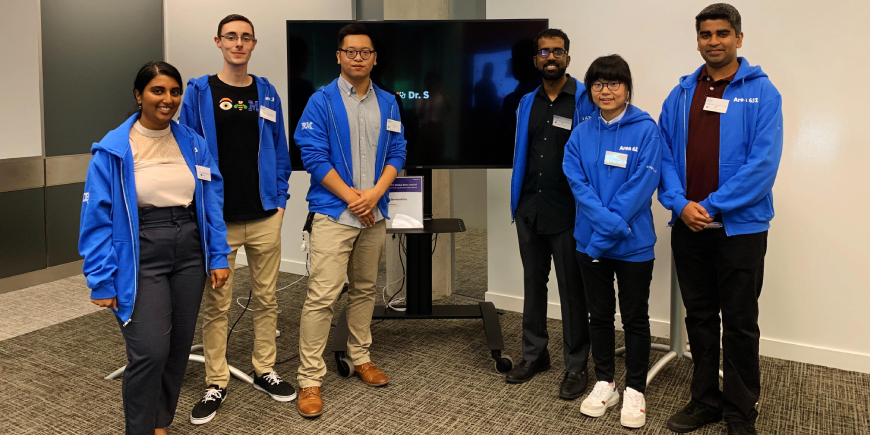
From the moment I learned that the co-op position I was applying for at IBM was a 16-month internship, I realized that I was in for a unique experience. Most design internships in Canada averages out to 4 or 8 months long, with 16-months being an exceptionally long period of internship. This raised all sorts of concerns, namely:
Is this internship worth 16 months, what am I even doing for that long?
If I move all the way there, they realize I’m a terrible design student, and I’m stuck there for 16 months?
I can quickly put the first question to rest. It has absolutely been worth it. I got to participate in IBM Canada’s Area 631 innovation incubator program, which brought together 6 individuals of different backgrounds (both interns and full-timers!) for 3 months working on 1 innovation. The idea was that our multi-disciplinary team would be given a prompt, and we would come up with an innovative working prototype that demonstrated enough value that IBM would fund our own project. What if we couldn’t pull it off? Well, no one told us what would happen – no pressure right?
What I’d really like to focus on, however, is the second concern. If this is the first time you’ve heard of the term, Imposter Syndrome “…is a psychological pattern in which an individual doubt their accomplishments and has a persistent internalized fear of being exposed as a ‘fraud’ (Langford, Clance, 1993). For a designer working at an engineering-led organization, the sensation is magnified as you realize you’re surrounded by incredibly intelligent people, who can speak at lengths about compilers and unit testing as easily as we might discuss the latest episode of the Mandalorian. This isn’t meant to belittle our chosen profession, as I firmly believe that design brings our own kind of intelligence and perspective to the industry; but you do grip your arts degree a little tighter as you watch your fellow intern, currently in her third year, educate an entire room of executives into stunned silence with her custom-built machine learning model. So how do you overcome that voice inside your head, telling you that you’re not good enough and that it’s only a matter of time before someone finds out you’re a fake?
If you come off only as of the shy intern, inexperienced and scared of the big kids; you’ll be perceived as such. It is, however, okay to admit to your team that you’re new to the industry and that you recognize you have a lot to learn, without underselling yourself. You were hired for a reason, and both your team and management have adjusted their expectations for you. As an intern, you’re here to leverage what you’ve learned in school to add value to the organization, while simultaneously learning from industry veterans to further your own growth. Be confident in backing up your work, and whenever you feel like you have a knowledge gap; ask questions and be prepared to do the research. In my case, because I was the only designer on the team, I was responsible for much of the product/business strategy, visual design, user research and the weekly pitches. No problem, I did that in school; however, the domain of hybrid database management was something new to me, and it took a lot of dumb questions, patient senior developers, and tons of HCI research papers on database administrators before I felt comfortable doing any design work.
This is easier said than done, especially when dealing with executives or any sort of upper management. When confronted with seniority or rank, I also err on the side of caution, generally choosing to keep my head down and letting my team lead handle any conflicts. If a moment arises where you truly believe that you need to speak up - great! Focus less on the titles and ranks of everyone in the room, and instead examine if the goals of the project are being met. At IBM, every project begins with an Enterprise Design Thinking workshop, where one of the key deliverables is a set of goals (referred to as hills) that everyone, from designer, developer, manager, must agree on before the project begins. While these hills iterate over time, whenever issues arise, you can back up your work or resolve a team conflict by pointing back to the hills that everyone agreed on and ask – “Hey, how does (whatever the issue is) contribute towards that hill”? This usually resets the room and helps you align your team with project goals rather than titles or ranks.
While the previous section talked about what you can do for yourself to address any insecurities, there are some things you should reach out to others for. Finding a career mentor early on during your internship will prove beneficial – I was lucky enough to find a mentor willing to chat about work, career, or random conversation, creating an atmosphere where I felt comfortable sharing my weaknesses and asking for help and feedback on my work. It might be awkward at first, but the sooner you ask your manager to help you find a mentor, the sooner the results will show in your work.
By being comfortable with showing vulnerability in the workplace, demonstrating an active interest in resolving any knowledge gaps I had as an early-career designer, and communicating closely with my mentors and management, I’d like to say that I’ve resolved my bout of Imposter Syndrome. Truth is, I doubt it’ll ever go away – all I can do is continue advocating for my beliefs in the work I do, trusting my diverse team of talented individuals, and relying on my mentors to keep me honest by providing critical feedback. I’m excited about what’s next for me and my team, as our product goes live into customers' hands and we begin the next iteration of restless reinvention, focusing on user outcomes.
Beyond the Blog
-
To learn more about opportunities like Joshua's, visit SFU's SIAT Co-op.












